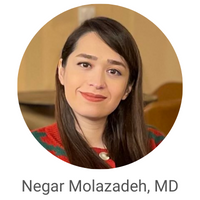NewsOct | 20 | 2022
Research Spotlight: The Potential for Comorbid Autoimmune Disorders in Patients with MOGAD

Negar Molazadeh, MD, a postdoctoral research fellow in the Department of Neurology at Massachusetts General Hospital and colleagues recently published a systematic review in the Multiple Sclerosis Journal - Experimental, Translational and Clinical: Autoimmune Diseases and Cancers Overlapping with Myelin Oligodendrocyte Glycoprotein Antibody-Associated Disease (MOGAD): A Systematic Review.
What was the question you set out to answer with this study?
Myelin oligodendrocyte glycoprotein antibody-associated disease (MOGAD) has various similarities with Aquaporine4-IgG positive Neuromyelitis Optica Spectrum Disorder (AQP4-IgG+NMOSD), in terms of clinical presentations and MRI findings.
However, AQP4-IgG+NMOSD is known to coexist with various autoimmune diseases and cancers, but we do not know if the same thing is true for MOGAD.
Therefore, for this systematic review, we aimed to find out if MOGAD is associated with systemic and organ-specific autoimmunity, cancers, or paraneoplastic syndromes.
What are two or three key takeaways?
- The most common autoimmune disease overlapping with MOGAD was anti-N-Methyl-D-Aspartate receptor encephalitis (anti-NMDAR-EN)—an autoimmune disease where the body creates antibodies against the NMDA receptors in the brain
- MOGAD was not found to coexist with other systemic and organ-specific autoimmune diseases and cancers.
- The evidence thus far does not support the need for routine screening of overlapping autoimmunity and neoplasms in patients with MOGAD, other than that the MOG-IgG test may be helpful in patients with the diagnosis of anti-NMDAR-EN, who develop atypical symptoms of encephalitis or MRI findings attributable to demyelination.
What were your conclusions?
The most common autoimmune disease overlapping with MOGAD was anti-N-Methyl-D-Aspartate receptor encephalitis (anti-NMDAR-EN), followed by autoimmune thyroid disorders, and the most common autoantibody was antinuclear antibody (ANA), followed by AQP4-IgG (double-positive MOG-IgG and AQP4-IgG).
A few sporadic cases of cancers and MOG-IgG-associated paraneoplastic encephalomyelitis were found. Therefore, while there was a little overlap between disorders, MOGAD was not found to coexist with various autoimmune disorders like AQP4-IgG+NMOSD does.
What's next?
Our study suggests that the connection between autoimmune diseases and MOGAD is low or at least less than AQP4-IgG + NMOSD, and further studies are needed to establish the predisposing factors in the development of concurrent autoimmune diseases or autoantibodies in patients with MOGAD.
Paper cited:
Molazadeh N, Bose G, Lotan I, Levy M. (2022) Autoimmune diseases and cancers overlapping with myelin oligodendrocyte glycoprotein antibody-associated disease (MOGAD): A systematic review. Multiple Sclerosis Journal - Experimental, Translational and Clinical. 2022;8(4). doi:10.1177/20552173221128170
About the Massachusetts General Hospital
Massachusetts General Hospital, founded in 1811, is the original and largest teaching hospital of Harvard Medical School. The Mass General Research Institute conducts the largest hospital-based research program in the nation, with annual research operations of more than $1 billion and comprises more than 9,500 researchers working across more than 30 institutes, centers and departments. In July 2022, Mass General was named #8 in the U.S. News & World Report list of "America’s Best Hospitals." MGH is a founding member of the Mass General Brigham healthcare system.
Type
Centers and Departments
Topics
Check out the Mass General Research Institute blog
Bench Press highlights the groundbreaking research and boundary-pushing scientists working to improve human health and fight disease.
Support Research at Mass General
Your gift helps fund groundbreaking research aimed at understanding, treating and preventing human disease.
